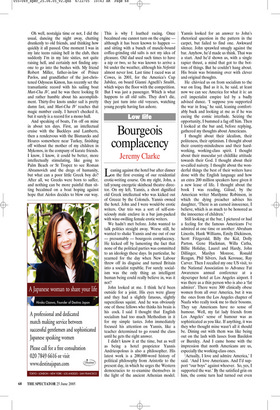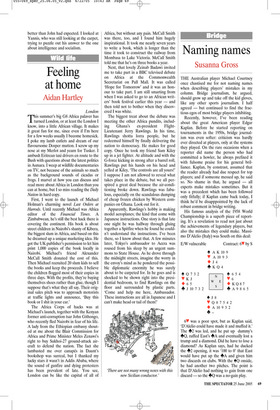Bourgeois complacency
Jeremy Clarke
Leaning against the hotel bar after dinner on the first evening of our residential erotic-writing course. On my right, John, a tall young energetic skinhead theatre director. On my left, Yannis, a short dignified old Greek intellectual who was kicked out of Greece by the Colonels. Yannis owned the hotel. John and I were would-be erotic writers. Our trio was a sort of self-consciously male enclave in a bar jam-packed with wine-swilling female erotic writers.
We hadn’t met before. John wanted to talk politics straight away. Worse still, he wanted to shake Yannis and me out of our — presumably — bourgeois complacency. He kicked off by lamenting the fact that none of the political parties was committed to an ideology these days. In particular, he yearned for the day when New Labour threw off its disguise and turned Britain into a socialist republic. For surely socialism was the only thing an intelligent human being could really believe in, was it not?
John looked at me. I think he’d been outside for a joint. His eyes were glassy and they had a slightly fatuous, slightly supercilious squint. And he was obviously one of those fellows who thinks his brain is his cock. I said I thought that English socialism had too much Methodism in it for my simple tastes. John immediately focused his attention on Yannis, like a teacher determined to go round the class until he gets the right answer.
I didn’t know it at the time, but as well as being a hotel proprietor Yannis Andricopolous is also a philosopher. His latest work is a 200,000-word history of political philosophy from Aristotle to the present day, in which he urges the Western democracies to re-examine themselves in the light of the ancient Athenian model. Yannis looked for an answer to John’s rhetorical question in the pattern in the carpet, but failed to find one. Awkward silence. John sprawled smugly against the bar. Anyhow, he’d made us think. That was a start. And he’d shown us, with a single rapier thrust, a mind that got to the bottom of things. But he couldn’t hang about. His brain was brimming over with clever and original thoughts.
He chivvied us on from socialism to the war on Iraq. Bad as it is, he said, at least now we can see America for what it is: an evil imperialist empire led by a badly advised dunce. ‘I suppose you supported the war in Iraq,’ he said, leaning comfortably back and looking at me as if he was cueing the comic interlude. Seizing the opportunity, I bummed a fag off him. Then I looked at the bar and, before replying, gathered my thoughts about Americans.
I thought about their idealism, their politeness, their optimism. I thought about their country-mindedness and their hardworking, working-class spirit. I thought about their muscular yet childlike attitude towards their God. I thought about their so-called naivety. I thought about the wonderful things the best of their writers have done with the English language and how an extra 200 million speakers have given it a new lease of life. I thought about the book I was reading, Gilead, by the American writer Marilynne Robinson, in which the dying preacher advises his daughter, ‘There is an earned innocence, I believe, which is as much to be honored as the innocence of children.’ Still looking at the bar, I pictured or had a feeling for the famous Americans I’ve admired at one time or another: Abraham Lincoln, Hank Williams, Emily Dickinson, Scott Fitzgerald, Billy the Kid, Dolly Parton, Gene Hackman, Willa Catha, Billie Holiday, Laurel and Hardy, John Dillinger, Marilyn Monroe, Ronald Reagan, Phil Silvers, Jack Kerouac, Ray Carver. Then I recalled my one US visit, to the National Association to Advance Fat Awareness annual conference at a skyscraper hotel at Los Angeles airport. I was there as a thin person who is also a ‘fat admirer’. There were 300 clinically obese women from all over America, but it was the ones from the Los Angeles chapter of Naafa who really took me to their bosoms. They say Americans have no sense of humour. Well, my fat lady friends from Los Angeles’ sense of humour was as sophisticated as you like. If anything, it was they who thought mine wasn’t all it should be. Dining out with them was like being out on the lash with lasses from Basildon or Burnley. And I came home with the impression that north Americans are us, especially the working-class ones.
‘Actually, I love and admire America,’ I said. ‘And I love Americans. And I’d support “our boys” against whoever. So, yes, I supported the war.’ By the satisfied grin on him, the comic turn had turned out even better than John had expected. I looked at Yannis, who was still looking at the carpet, trying to puzzle out his answer to the one about intelligence and socialism.



































































 Previous page
Previous page